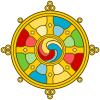|
Chime Rinpoche
Lama Chime Tulku Rinpoche is a Tibetan Buddhist, Tulku and Dharma teacher. Chime Rinpoche was born in 1941 in Kham, Tibet.[1] In 1959, due to the annexation of Tibet, he was forced to flee to India via Bhutan into exile. Gaining British citizenship in 1965, he taught extensively throughout Europe and established Marpa House, the first Tibetan Buddhist Centre in England. His students include American author and Buddhist nun Pema Chödrön and musicians Mary Hopkin, David Bowie and Tony Visconti. Early life in TibetChime Rinpoche was born in Jyekundo, Kham, East Tibet, Tibet, into a family that were direct descendants of the chieftain Rardha Pontsong, who was inspired to give his land to the 4th Sangye Nyenpa so that Benchen Monastery could be built (in the 14th century).[2] He was not the only Tulku in his family, as both Dilgo Khyentse Rinpoche and the 9th Sangye Nyenpa Rinpoche were his maternal uncles.[3] He was educated at Benchen Monastery,[4] where he completed academic studies as well as a traditional three-year, three-month retreat. Chime Rinpoche studied and combined the practices of Mahamudra and Dzogchen (Atiyoga) through receiving instructions in Mahamudra from Kabje Sangye Nyenpa and Dzogchen from Dilgo Khentse Rinpoche.[5]  Escape from Tibet
Due to the invasion of Tibet and subsequent occupation by the Chinese army, the 16th Gyalwa Karmapa indicated that Chime Rinpoche should flee Tibet.[6] In 1959, Chime Rinpoche reached India via Bhutan alongside his Root Gurus and maternal uncles, Dilgo Khyentse Rinpoche and 9th Sangye Nyenpa Rinpoche.[7] Life in BritainIn 1965, Lama Chime was invited to live in the UK. He shared a small apartment with Chögyam Trungpa Rinpoche and Akong Rinpoche in Oxford.[8][9] He later gained British citizenship, registered 22 October 1970 [10] and has lived in Britain ever since.[7] As Akong Rinpoche was the first one to find paid employment, becoming a hospital orderly, Akong supported both Chime Rinpoche and Trungpa Rinpoche.[11] Marpa HouseIn 1973, Chime Rinpoche founded Kham House in Ashdon, Essex, UK the first Tibetan Buddhist Centre in England.[12][13] The building was purchased with the help of sponsors. Previously an orphanage for homeless children called All Saints' Home, it was built by the rector of Ashdon Henry Barclay Swete.[14][15] In 1975, just two years after Kham House was established, the 16th Karmapa visited this centre after visiting the Kagyu Samyé Ling Monastery and Tibetan Centre earlier in the year.[16] Kham House was later renamed Marpa House and is run by the charity The Dharma Trust.[17] Although presently in poor health, Chime Rinpoche still teaches at Marpa House on occasion. Status as a TulkuDuring his 1975 visit, the 16th Karmapa identified Chime Rinpoche as Radha Tulku, the incarnation of Radha Phuntsok, one of the four Tulkus (incarnate Lamas) of Benchen Monastery.[16][18] The Four Benchen Tulkus are:
In 2011, Chime Rinpoche travelled from London for a surprise reunion with two of the other Benchen Tulkus, Sangye Nyenpa Rinpoche and Tenga Rinpoche, to the 2011 Summer Camp at Benchen Phuntsok Ling, Benchen's European headquarters.[19] Personal lifeIn England, Chime Rinpoche chose to stop being a monk and married.[16][20] He and his English wife had three daughters, all of whom are now adults.[21] In Britain, Chime Rinpoche is the President of the Tibetan Terrier Association, a club that is dedicated to preserve and promote the Tibetan Terrier breed of dog. The club was established in 1967.[22] Rinpoche still teaches occasionally at Marpa House when his health permits and annually leads a ten-day Summer School retreat in Baerenthal in northeastern France.[23] In a video message to his students on the passing of Tenga Rinpoche, Chime Rinpoche stated that he is preparing for his own visit to the 'Pure Lands' by praying and meditating more but assures his students that it is 'a very nice place, very nice'.[24] Work at the British LibraryRinpoche was employed by the British Library as Curator for Ancient Tibetan Manuscripts for 16 years.[13] Notable students

Bibliography
See alsoReferences
External links |
||||||||||||||||||||||||||||||||||||||
